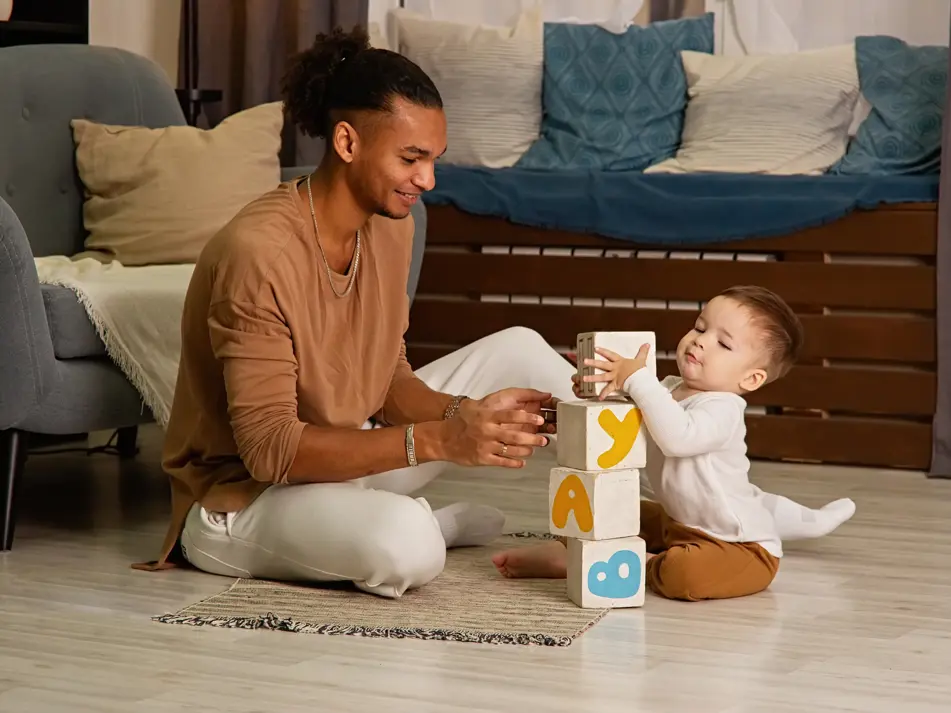Toddler Play 9 to 18 Months

There are lots of fun activities you can do with your baby now they're getting a little bit older. Babies at 9 - 18 months are increasingly mobile, curious about the world around them, and eager to interact.
Activities that encourage movement, help them learn language and learn more about music are ideal for toddler learning.
However at this age, you are their favourite play object. Follow their lead and you will experience a new insight into their world.
Activities for a 9 month old baby
Crawling games: Help give your 9 month old opportunities to crawl. Place them on their tummy and put a brightly coloured toy just out of their reach. You could sometimes put your hand behind their feet to help give them a push. Don't forget to cheer on your baby - they love verbal encouragement!
Bath time: Bath time is now great fun. As your baby learns to sit on their own, they will become very adventurous and will play with sponges, floating toys, bubbles and cups. Of course, it's important that you never leave them alone in the bath.
Activities for a 10 month old baby
Hand games: Play simple hand games like “peek-a-boo”, “this little piggy”, and “round and round the garden.” Your baby might start to try and copy you which can lead to lots of giggles from you both.
Hide and seek: Hide a toy under a blanket and ask your baby where it went. This also helps with understanding object permanence.
Activities for an 11 month old baby
Music: Babies love music. Start by singing nursery rhymes and doing the actions. You could also play some music and dance with your baby or if they can stand, you could help them dance along.
As your baby grows, you can also introduce them to small instruments like shakers or drums or even a saucepan and wooden spoon.
Movement toys: As your baby becomes more active, provide toys that will help develop their movement skills. For example, a cardboard box to crawl through, sand and water play, a push along wagon and pull–along toys.
Activities for a 1 year old
Reading books: Even if they can't understand everything, babies love reading books. They provide opportunities to tell stories using descriptive language. Choose colourful picture books and point out objects as you read. Remember to position your baby so they can see your face as well as the book.
eBook readers are fine to use occasionally but it's all about finding a balance. Your baby also needs to develop fine motor skills to turn the pages of a hard covered book.
Painting: This is a great way for toddlers to learn about creativity. With non-toxic, baby-safe paints, let your baby create their first masterpieces on paper. You could give them a paint brush, sponges, a potato with cut out shapes or they could even just use their hands.
Activities for a 13 to 15 month old baby
Stacking and Knocking Over: Babies love to stack things and then knock them over. Use blocks, cups, or soft toys to create a fun game.
Sensory containers: Fill a big container with safe items like large pompoms, soft fabric, or even safe things they can eat like cooked spaghetti. Your baby can explore different textures and have fun squishing, grabbing, or even tasting.
Activities for a 16 to 18 month old baby
Explore nature: Hang out with your baby in the backyard or take them for a walk in the park or the bush. Let them touch the leaves and feel the grass (although make sure they don't put too much in their mouth!). You could point out the birds and any other animals you find.
Play Dough: Your baby might be ready to play with play dough at this age. Under supervision, they will squish it, roll it and enjoy its soft texture.
Top tips about 9 to 18 month baby play
-
1
You’re the best play object your baby can have.
-
2
Supervise closely at all times, especially around water and climbing equipment.
-
3
Ask your local council or library about whether they have a toy library. Similar to a book library, you can borrow age appropriate toys for a few weeks at a time.
-
4
You could also talk to your local council or community centre about play groups where your toddler can play with other children and you can meet other parents.
Digital technology and your baby
Babies are very attracted to the rapidly changing colours and bright lights of many digital devices. However, we recommend parents avoid or limit exposing their babies to television, computers, tablets, mobile devices and playstations at this age.
The Australian guidelines don't recommend any screen time for children younger than 2 years old. There is no evidence that television or digital devices will help with your baby’s learning.
Interacting with people is the best way to enhance your toddler’s learning.




































